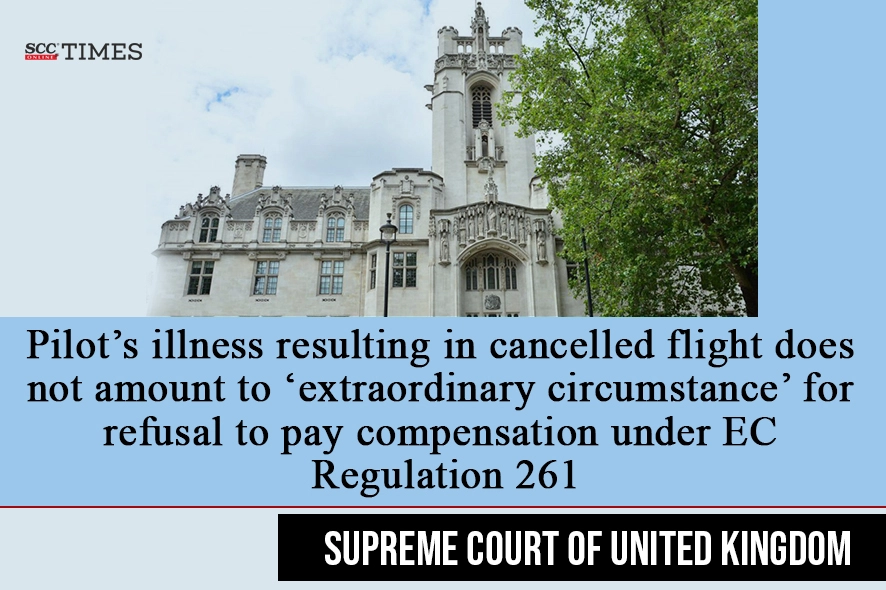Supreme Court of United Kingdom: In the instant appeal, the Court had to consider that whether a pilot unexpectedly falling ill while off-duty is an “extraordinary circumstance which could not have been avoided even if all reasonable measures had been taken” within the meaning of EC Regulation 261/2004 (EC Regulation), which provides for air carriers to pay compensation to passengers of cancelled flights? The Bench of Lord Lloyd Jones, Lord Sales, Lord Burrows, Lady Rose and Lady Simler, JJ., unanimously held that the pilot falling ill did not amount to an extraordinary circumstance within the meaning of EC Regulation 261. The Court held that the pilot’s non-attendance due to illness was an inherent part of the appellant’s activity as an air carrier and cannot be categorised as extraordinary.
The Court pointed out that EC Regulation 261 is intended to provide a standardised level of compensation for passengers which does not require complex analysis. Requiring an enquiry into why, when and how a staff member became ill would be contrary to the intended operation of the scheme.
Background: The respondents were booked onto a flight from Milan Linate Airport to London City Airport on 30-01-2018 operated by the appellant airline, Cityflyer. The flight was cancelled because the pilot did not report for work due to illness and it was not possible to find a replacement pilot. The respondents were rebooked onto a replacement flight and landed in London just over 2.5 hours later than scheduled. The respondents claimed compensation from Cityflyer under Regulation (EC) 261/2004 of 11.
EC Regulation 261 entitles passengers to compensation for cancelled flights and airlines must show that the cancellation was the result of “extraordinary circumstances which could not have been avoided even if all reasonable measures had been taken”.
Cityflyer refused to pay compensation on the ground that the pilot falling ill was an extraordinary circumstance. The respondents’ claim was dismissed by a Deputy District Judge in the Portsmouth County Court, and on appeal by a Circuit Judge at the Winchester County Court. The respondents then appealed to the Court of Appeal, which determined that the defense was not made out and upheld the claim. Aggrieved by the decision of Cout of Appeals, Cityflyer appealed before the Supreme Court.
Court’s Assessment:
Considering the matter, the Court had to ascertain which law would be applicable to a cause of action that accrued under an EU Regulation prior to Brexit. The Court noted that on the date of respondents’ flight, the EU text of Regulation 261 applied in the UK by virtue of Section 2(1) of the European Communities Act 1972. However, by the date of the Court of Appeal hearing, the Brexit happened and the ECA 1972 had been repealed by the European Union (Withdrawal) Act 2018 (EUWA). The Court perused the provisions of EUWA and amendment in EC Regulation 261 by the Passenger Flights and Air Travel Organisers’ Licensing (Amendment) (EU Exit) Regulations 2019.
The Court pointed out that a basic principle of the rule of law is that the applicable law is the one that is in force at the time when the event occurred, and there was nothing to suggest that the Amended Regulation 261 was intended to apply to fact patterns arising before it came into force. The relevant text of Regulation 261 for the respondents’ claim is the EU text as it stood immediately before IP completion day (certain EU enactments and rights to remain in domestic law after 31-12-2020 as per EUWA).
Vis-a-vis the issue of the Cityflyer pilot’s illness being an ‘extraordinary circumstance’, the Court stated that Cityflyer bears the burden of proving that the captain’s non-attendance due to illness fell within the concept of extraordinary circumstances. The meaning of the phrase must be interpreted considering the purpose of Regulation 261, which is to ensure a high level of protection for consumers.
The Court unanimously held that the pilot’s non-attendance due to illness was an inherent part of Cityflyer’s activity as an air carrier and cannot be categorised as extraordinary. That phrase ‘extraordinary circumstance’ must be given its usual meaning, which denotes something out of the ordinary.
The Court pointed out that staff illness is commonplace for any business. Just as the wear and tear of an aircraft’s physical components is considered an inherent part of an air carrier’s activity, similarly, managing illness of staff is also an inherent part of an air carrier’s activity. The Court emphasised that it is irrelevant whether staff fall ill while they are off duty; their attendance or non-attendance for work is an inherent part of the carrier’s operating system. The Court also opined that it is significant that pilots are subject to rules outside their working hours, such as a ban on drinking in the lead-up to a flight.
Therefore, with the afore-stated analysis, the Court dismissed the instant appeal by Cityflyer.
[Lipton v. BA Cityflyer, [2024] 3 WLR 474, decided on 10-7-2024]
Leading judgment by Lord Sales and Lady Rose






